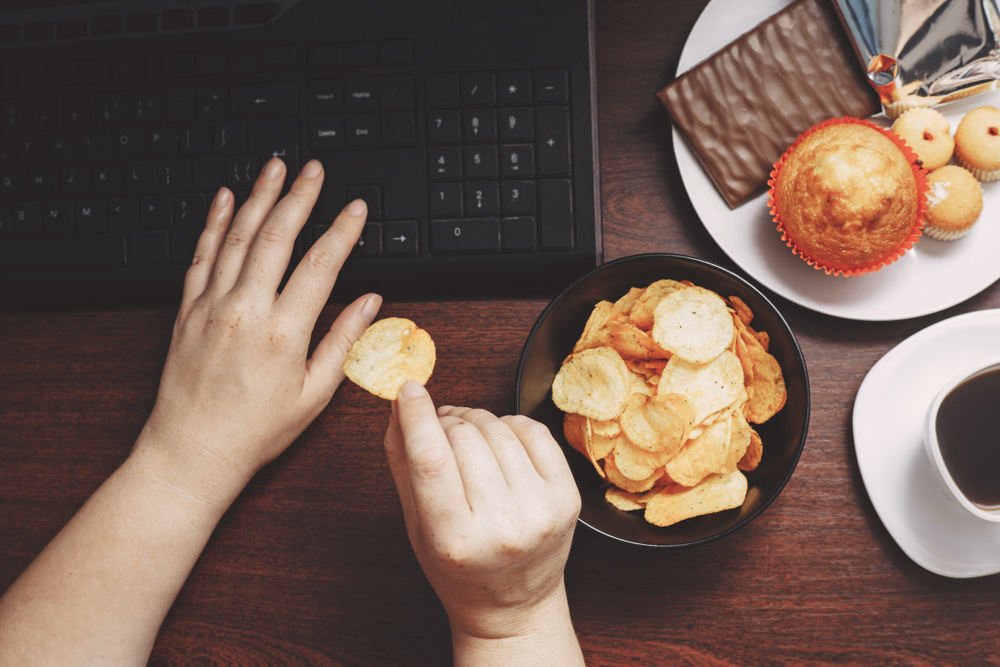One minute, you’re sailing through daily tasks and the next: you’re re-reading the same email four times because you just can’t concentrate. If this sounds like a typical workday: what you’re eating (and drinking) is likely affecting your ability to focus and be productive.
Whether your goals include energetically moving up the corporate ladder — or more urgently figuring out how to sail through your next big presentation without anxious jitters — it’s probably time to take a closer look at your diet before opting for a second (or third) cup of coffee.
In terms of eating for success: nutritionists and registered dietitians are often asked when to eat, what to eat and how much to eat in order to lose weight or obtain optimal health. But, they also know what’s best to consume on the job for career achievement.
Point blank: there’s a lot of misinformation on the Internet about food, especially as it relates to productivity. To combat these diet myths, we asked registered dietitians and nutritionists to explain what to eat, what to avoid, and what else you need to know, in order to accomplish your best work.
Myth: Starting your day with coffee will keep you energized throughout the day
Truth: “There are a lot of benefits to coffee but there is one huge downside,” said Dr. Daryl Gioffre, a celebrity nutritionist in New York City. “It’s loaded with acids that actually drive up inflammation, and can drain you of the minerals you need to perform, both mentally and physically. Dark leafy greens such as kale, spinach, watercress, and Swiss chard are the richest sources of minerals. They are also rich in beta-carotene and vitamin C, needed to boost antioxidant levels and support optimal brain functioning.”
Myth: Other forms of caffeine are less disruptive than coffee
Truth: “When we think of a quick burst of energy, many of us think of coffee or caffeinated beverages for a quick jolt,” said Brooke Scheller, DCN, CNS, Director of Nutrition at Freshly. “However, overconsuming caffeine can actually increase anxiety levels in certain people. That means that too much of a good thing can actually decrease your focus and productivity. I recommend swapping out that second cup with more water. Dehydration can actually bring about low focus and decreased energy. A general recommendation is to consume half of your body weight in ounces of water.”
Myth: Snack frequently for optimal energy
Truth: “These constant fluctuations in our blood sugar can actually trigger more hunger pangs and less focus and productivity,” said Scheller. “It is best to schedule meals and snacks roughly three to four hours apart. If you’re ensuring that you take in enough protein and healthy fats, you’ll remain more even-keeled in your energy levels.”
Myth: Carbs are unhealthy and make you tired
Truth: “A carbohydrate is a macronutrient, and many of our cells’ preferred fuel source,” said Leah Silberman, the founder of Tovita Nutrition and RD at Wellhaus. “Certain types of processed carbohydrates have little to no nutritional value — white bread, white rice, etc. — but many carbohydrates are incredible sources of vitamins, minerals, nutrients, and fiber. In fact, some of the healthiest foods contain carbohydrates. Antioxidant-rich berries have lots of carbs! Sweet potatoes loaded with beta carotene = carbs! Beans and legumes loaded with fiber and natural prebiotics!? Yep, they’re carb-heavy too.”
Myth: I’m too busy, I can supplement food rather than eating it
Truth: “While supplements can provide an incredible insurance policy to our diets, they are meant to supplement our diets — not to be consumed in lieu of,” said Silberman. “Supplements typically provide single vitamin or mineral doses or a cocktail of a select few vitamins. Food, however, contains a wide array of vitamins, minerals, antioxidants, phytonutrients, and more, that provide a host of health benefits. If we were to heavily rely on supplements, we would be missing out on the synergistic effect of nutrients from foods.”
Myth: If it’s organic, it’s healthy
Truth: “Organic means a given food is free of pesticides, herbicides, or artificial ingredients. However, a food-laden with organic cane sugar, organic coconut sugar, and/or organic gums is not considered healthy — at least in my book,” said Silberman. “I encourage my clients to be label-detectives and truly read ingredient lists, beyond the advertising on the front of the box!”
Myth: A cup of coffee will solve the “afternoon crash”
Truth: “The afternoon slump is a natural and normal process, likely resulting from a combination of your body’s natural rhythm, sitting still for hours and possibly eating a lunch high in simple carbs and low in protein,” said Tracy Lockwood Beckerman, a registered dietitian and author of The Better Period Food Solution. “You might think the best way to overcome the crash is to grab another cup of coffee, but the best thing to do is to craft a snack that is full of fiber, protein, and fat — like vegetables or whole-grain crackers with hummus or a crisp and refreshing apple with your favorite nut butter.”
Myth: All calories are created equal
Truth: “A calorie may just be a calorie, but everyone’s metabolism is unique,” said Dr. Philip Goglia, co-founder of G-Plans. “For example, if you better metabolize fats and proteins, but you are eating a diet that is high in carbs, those calories you are ingesting will not efficiently repair and fuel your body. Many people under-eat, as they view food as adversarial — the thing that makes them fat. In turn, they are in a constant state of disrepair. The result is water retention, fat hoarding, exhaustion, inconsistent digestion moods, and sleep patterns.”
Before your next coffee break or walk to the refrigerator, keep these truths and tips in mind for a more productive workday.
Originally published on Ladders.
Follow us here and subscribe here for all the latest news on how you can keep Thriving.
Stay up to date or catch-up on all our podcasts with Arianna Huffington here.


